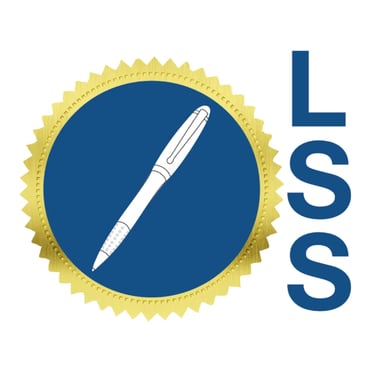Are Mobile Loan Signings Worth the Cost?
LOAN SIGNING SERVICES
Frank L Coxx
5/9/20257 min read


Introduction to Mobile Loan Signings
Mobile loan signings represent a pivotal development in the loan signing process, offering convenience and flexibility for borrowers and lenders alike. The concept revolves around the provision of notary services at a location that suits the signer, rather than requiring them to visit a bank or office. Mobile notaries or signing agents facilitate this process by traveling to meet clients in various settings, be it their homes, workplaces, or other convenient locations, making it a practical solution for many.
The general process of a mobile loan signing is straightforward. Once the borrower has received their loan documents, they can schedule an appointment with a mobile notary. The notary arrives at the agreed location with the necessary documents and verifies the signer's identity, ensuring that all required signatures are obtained correctly. This service significantly alleviates the pressure on borrowers who may have challenges fitting traditional in-person signings into their schedules.
In recent years, mobile loan signings have gained popularity due to their ability to provide time-saving solutions. With busy lifestyles and the increasing demand for accessibility, many individuals find it inconvenient to allocate significant time for office visits, particularly when they can fulfill their obligations from the comfort of their chosen environment. Additionally, mobile signings enable a more personalized experience, allowing borrowers to ask questions and receive guidance during the signing process in a less formal setting. As digital technology continues to evolve, mobile loan signings are becoming an integral part of the real estate and lending industries, helping to streamline transactions while adhering to legal correctness.
Benefits of Mobile Loan Signings
Mobile loan signings present a multitude of advantages for both borrowers and lenders, primarily revolving around convenience and flexibility. One of the most notable benefits is the ability for a notary to come directly to the borrower’s location. This eliminates the need for clients to navigate busy schedules or travel to a specific office, which can be particularly advantageous for those with mobility challenges or other commitments that may hinder standard signing processes. By bringing the services directly to clients, mobile notaries enhance accessibility, making the loan signing experience straightforward and efficient.
Additionally, the flexibility in scheduling that mobile loan signings provide cannot be understated. Traditional loan signings often require clients to adhere to strict office hours, which may not align with their personal schedules. Mobile notaries can offer their services during evenings or weekends, accommodating the needs of clients who may have work commitments or family obligations during standard business hours. This adaptability not only promotes higher client satisfaction but also streamlines the loan process, as clients can choose a time that works best for them.
Furthermore, mobile loan signings can potentially expedite the overall loan processing times. By allowing for quicker signings, lenders can receive documents back more swiftly, reducing waiting periods and facilitating faster approvals. Since the remote nature of mobile signings allows for real-time communication and document delivery, loans can progress more rapidly through the various stages of processing. This efficiency benefits all parties involved, as it translates to a smoother experience throughout the entire mortgage or loan journey. In essence, the convenience, flexibility, and efficiency provided by mobile loan signings markedly enhance the overall experience for clients and lenders alike.
Costs Associated with Mobile Loan Signings
The integration of mobile loan signings has notably transformed the closing process within the real estate domain, providing convenience for both borrowers and lenders. However, it is crucial for individuals considering this option to understand the various costs associated with mobile loan signings.
Typically, mobile notaries charge a base fee for their services, which may range widely depending on geographical location, the complexity of the signing, and the notary's experience. On average, borrowers can expect to pay between $75 to $200 for standard loan document signings. In addition to the base fee, it's essential to be aware of additional costs that may arise. For instance, travel fees often apply when mobile notaries must travel a significant distance beyond a specified radius, which generally ranges from $25 to $50 per hour of travel.
Moreover, expedited services are another prevalent additional cost. If the borrower requires last-minute signings, many mobile notaries offer expedited services for an extra fee, which could lead to an increase of 50% or more over the standard costs. Other potential costs might include administrative fees for processing documents and variable charges for specialized services, such as faxing or printing additional copies of documents, which can add up quickly if multiple copies are required.
When comparing mobile loan signings to traditional signing options, it is apparent that mobile services are typically more expensive. Traditional signings may involve lower fees as they often take place in a lender's office, eliminating travel and expedited service costs. However, the convenience of mobile signings can justify the extra expense for borrowers. Understanding these costs is vital for making an informed decision about the method of the loan signing process. Comparison of fees can lead borrowers to choose the service that best fits their budget and needs.
Comparing Mobile Signings to Traditional Signings
In today's fast-paced world, the methods by which loans are signed have evolved significantly. Mobile loan signings, conducted at the client's preferred location, are becoming a popular alternative to traditional in-office signings. A comparative analysis of these two approaches reveals various factors worth considering, particularly convenience, time efficiency, and overall client satisfaction.
Convenience is often cited as the foremost advantage of mobile loan signings. Clients have the flexibility to choose the location and timing of the signing, whether at home, a coffee shop, or even at work. This flexible arrangement caters to individual schedules, allowing for greater accessibility, particularly for busy professionals or those with mobility issues. In contrast, traditional signings typically require clients to visit a designated office, which can be a logistical challenge, especially when factoring in travel time and potential conflicts with work hours.
Time efficiency is another critical factor to consider. Mobile loan signings can significantly reduce the duration of the signing process. The notary or loan signing agent can meet with clients at their convenience, often leading to quicker turnaround times. For clients, this means completing necessary paperwork without the cumbersome waits often associated with traditional office appointments, where multiple clients may be scheduled for the same time slot. On the other hand, traditional signings might involve longer waits due to the need for multiple party availability at the same location.
Lastly, client satisfaction tends to lean in favor of mobile signings. Clients appreciate the personalized service and the comfort of signing documents in familiar surroundings. This positive experience can foster better relationships and trust between clients and service providers. However, it is important to note that traditional signings may still hold merit in certain situations, particularly where in-person identification verification or the presence of multiple parties is crucial.
When It Makes Sense to Use Mobile Loan Signings
Mobile loan signings offer a convenient solution for various circumstances, making them a worthy consideration for individuals and businesses alike. One notable scenario where mobile signings shine is during last-minute closings. In real estate transactions, time is often of the essence. Should a buyer or seller find themselves facing an unexpected urgency to finalize paperwork, a mobile loan signing service can facilitate a swift and seamless conclusion without the logistical delays associated with traditional signing methods.
Additionally, mobile loan signings are especially beneficial for clients residing in remote areas. For individuals living far from notary public services or not within proximity to a bank branch, traveling to complete loan documents can be an unforeseen inconvenience. Mobile notaries can travel to these clients, ensuring they can sign the necessary documents without enduring exhausting commutes. This feature reinforces the accessibility of essential financial services, illustrating how mobile signings can bridge geographical gaps.
Furthermore, busy professionals frequently struggle to find time in their hectic schedules to dedicate to essential tasks like loan signings. This demographic can greatly benefit from the flexibility offered by mobile services, allowing them to have documents signed on their terms—be it at work during lunch breaks or at home during after-hours. For those with special needs, including individuals with disabilities or health concerns, mobile loan signings provide an accommodating solution that removes barriers that traditional methods may impose. Such clients can have the necessary documents signed in a familiar environment, fostering comfort and convenience.
In these scenarios, the cost associated with mobile loan signings is often justified, as the benefits extend beyond mere convenience. They provide a tailored approach to financial transactions, ensuring that crucial processes can be handled with efficiency and care.
Potential Drawbacks of Mobile Loan Signings
Mobile loan signings present several challenges that potential borrowers should consider before opting for this service. One of the primary drawbacks is the associated costs. While mobile signers aim to provide convenience, this can often come with a premium price tag. Borrowers may find themselves facing additional fees that are typically not charged in traditional in-office signings. These extra expenses can become a significant factor, especially for individuals on tight budgets or those concerned about maximizing their financial resources.
Moreover, the need for coordination and scheduling adds another layer of complexity. Arranging a mobile signing requires effective communication between the borrower, the notary, and typically the lender. This coordination can sometimes lead to delays if schedules do not align or if unforeseen circumstances arise, such as traffic or last-minute changes. Unlike in-office signings, where everything occurs in a controlled environment, mobile signings often involve variable external factors that can affect timing and reliability. These uncertainties can induce stress or confusion for borrowers who are striving to finalize their loans promptly.
A further potential drawback is the risk of not receiving a thorough explanation of documents. During traditional in-office signings, lenders or their representatives are generally present to guide borrowers through each form, ensuring clarity and understanding. In contrast, mobile signings may not always provide the same level of personal interaction. The borrower may feel rushed or pressured, leading to a lack of comprehensive understanding of the documents involved. This disconnect can be particularly concerning for individuals who require a clearer grasp of the terms and conditions they are signing, underscoring the importance of weighing the benefits against these potential pitfalls.
Conclusion: Making an Informed Decision
In assessing the viability of mobile loan signings, it is imperative to weigh the associated costs against the benefits. Mobile loan signings can offer exceptional convenience and time savings, especially for individuals who lead busy lives or who may have mobility challenges. This modern approach minimizes the need for travel, allowing clients to finalize their loans in the comfort of their own homes, thereby eliminating potential delays often associated with traditional signings. However, this convenience comes with a price, and one must carefully consider if this added cost aligns with their financial capabilities and overall priorities.
Readers are encouraged to take a close look at their specific circumstances when deciding between mobile and traditional loan signings. Factors such as the complexity of their loan, the urgency of the signing, and personal preferences should all influence this decision. For instance, in situations where time is of the essence or in cases with a higher degree of complication, the benefits of mobile signings may outweigh the costs. Conversely, if the loan process is straightforward, sticking to traditional methods might be more cost-effective without sacrificing efficiency.
Ultimately, the choice between mobile and traditional loan signings hinges upon an individual's values and unique situation. It is essential to evaluate how much importance one places on the convenience of mobile services versus the expenses incurred. By meticulously analyzing these factors, individuals will be better equipped to make informed decisions that not only fulfill their immediate needs but also suit their long-term financial goals. Taking the time to weigh these considerations can lead to more satisfactory outcomes in the loan process.


